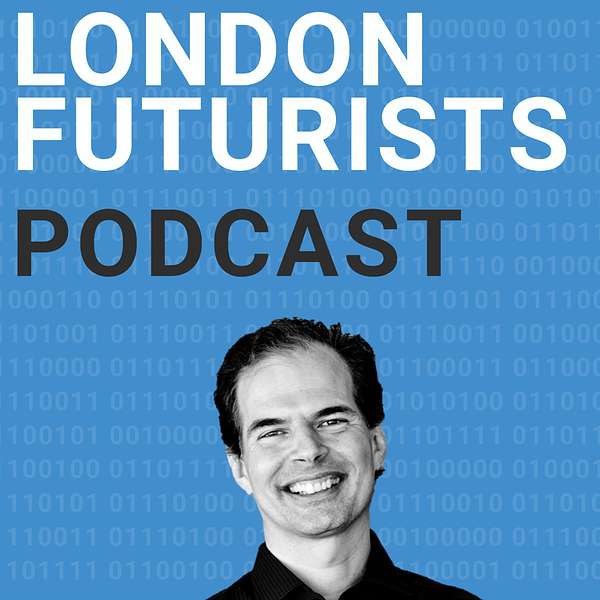
London Futurists
Anticipating and managing exponential impact - hosts David Wood and Calum Chace
Calum Chace is a sought-after keynote speaker and best-selling writer on artificial intelligence. He focuses on the medium- and long-term impact of AI on all of us, our societies and our economies. He advises companies and governments on AI policy.
His non-fiction books on AI are Surviving AI, about superintelligence, and The Economic Singularity, about the future of jobs. Both are now in their third editions.
He also wrote Pandora's Brain and Pandora’s Oracle, a pair of techno-thrillers about the first superintelligence. He is a regular contributor to magazines, newspapers, and radio.
In the last decade, Calum has given over 150 talks in 20 countries on six continents. Videos of his talks, and lots of other materials are available at https://calumchace.com/.
He is co-founder of a think tank focused on the future of jobs, called the Economic Singularity Foundation. The Foundation has published Stories from 2045, a collection of short stories written by its members.
Before becoming a full-time writer and speaker, Calum had a 30-year career in journalism and in business, as a marketer, a strategy consultant and a CEO. He studied philosophy, politics, and economics at Oxford University, which confirmed his suspicion that science fiction is actually philosophy in fancy dress.
David Wood is Chair of London Futurists, and is the author or lead editor of twelve books about the future, including The Singularity Principles, Vital Foresight, The Abolition of Aging, Smartphones and Beyond, and Sustainable Superabundance.
He is also principal of the independent futurist consultancy and publisher Delta Wisdom, executive director of the Longevity Escape Velocity (LEV) Foundation, Foresight Advisor at SingularityNET, and a board director at the IEET (Institute for Ethics and Emerging Technologies). He regularly gives keynote talks around the world on how to prepare for radical disruption. See https://deltawisdom.com/.
As a pioneer of the mobile computing and smartphone industry, he co-founded Symbian in 1998. By 2012, software written by his teams had been included as the operating system on 500 million smartphones.
From 2010 to 2013, he was Technology Planning Lead (CTO) of Accenture Mobility, where he also co-led Accenture’s Mobility Health business initiative.
Has an MA in Mathematics from Cambridge, where he also undertook doctoral research in the Philosophy of Science, and a DSc from the University of Westminster.
London Futurists
Provably safe AGI, with Steve Omohundro
Use Left/Right to seek, Home/End to jump to start or end. Hold shift to jump forward or backward.
AI systems have become more powerful in the last few years, and are expected to become even more powerful in the years ahead. The question naturally arises: what, if anything, should humanity be doing to increase the likelihood that these forthcoming powerful systems will be safe, rather than destructive?
Our guest in this episode has a long and distinguished history of analysing that question, and he has some new proposals to share with us. He is Steve Omohundro, the CEO of Beneficial AI Research, an organisation which is working to ensure that artificial intelligence is safe and beneficial for humanity.
Steve has degrees in Physics and Mathematics from Stanford and a Ph.D. in Physics from U.C. Berkeley. He went on to be an award-winning computer science professor at the University of Illinois. At that time, he developed the notion of basic AI drives, which we talk about shortly, as well as a number of potential key AI safety mechanisms.
Among many other roles which are too numerous to mention here, Steve served as a Research Scientist at Meta, the parent company of Facebook, where he worked on generative models and AI-based simulation, and he is an advisor to MIRI, the Machine Intelligence Research Institute.
Selected follow-ups:
Steve Omohundro: Innovative ideas for a better world
Metaculus forecast for the date of weak AGI
"The Basic AI Drives" (PDF, 2008)
TED Talk by Max Tegmark: How to Keep AI Under Control
Apple Secure Enclave
Meta Research: Teaching AI advanced mathematical reasoning
DeepMind AlphaGeometry
Microsoft Lean theorem prover
Terence Tao (Wikipedia)
NeurIPS Tutorial on Machine Learning for Theorem Proving (2023)
The team at MIRI
Music: Spike Protein, by Koi Discovery, available under CC0 1.0 Public Domain Declaration
Elevate how you lead with insight from today’s most influential executives.
Listen on: Apple Podcasts Spotify

